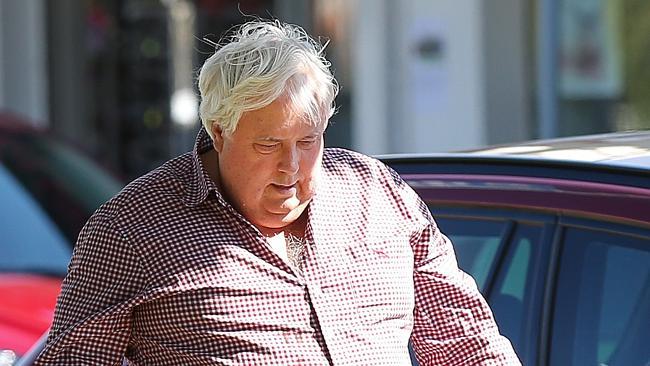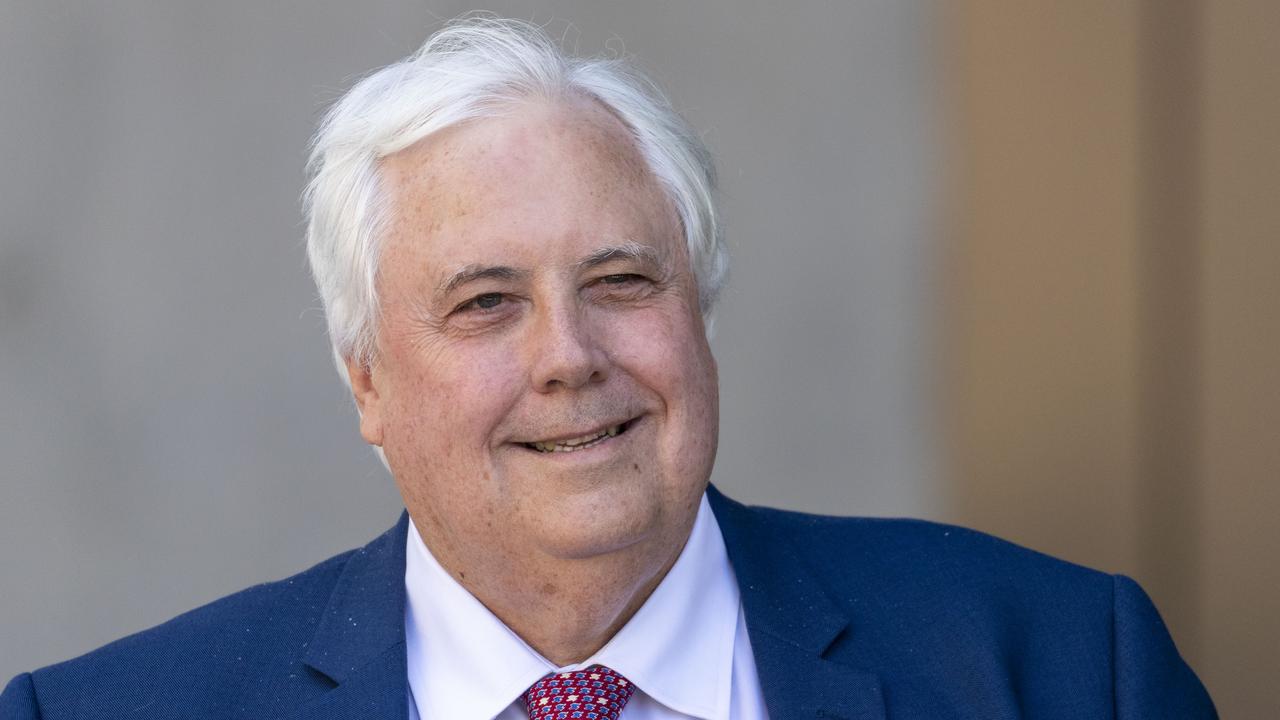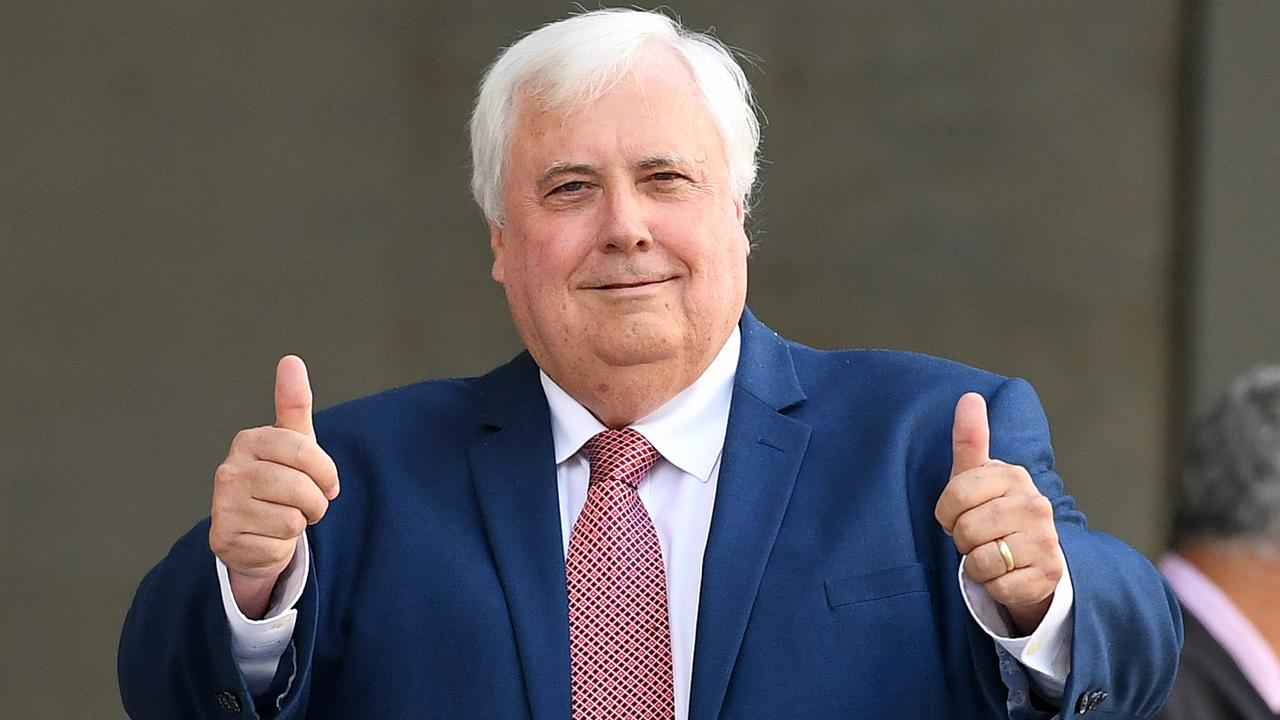Clive Palmer faces jail risk over $200m cash siphon
Clive Palmer faces the possibility of up to five years’ jail after siphoning more than $200m from Queensland Nickel.

Federal MP Clive Palmer faces the possibility of up to five years’ jail, bankruptcy and the unravelling of his financial empire after he was found to have siphoned more than $200 million from his cash-strapped Queensland Nickel to his other businesses before its collapse.
A crushing administrators’ report recommends the refinery company be put into liquidation, finding it may have traded while insolvent and that Mr Palmer secretly acted as a “shadow director”, making him personally liable for the company’s collapse.
It also exposes the rest of his empire to possible legal plundering to repay $300m in debts owed to nearly 800 sacked workers and other creditors.
Administrators say Mr Palmer for years used QN as a “piggy bank” to prop up his other businesses, spending $21.5m on donations to his political party, nearly $6m on his ill-fated attempt to rebuild the Titanic, $5m on 60 vintage cars for his Sunshine Coast golf resort and $38m to him, his wife and his father-in-law on a single day in 2012.
Of $224m in QN funds siphoned to other businesses since February 2011, $189m of the loans were forgiven.
The corporate watchdog is already investigating the failure of the Townsville refinery and will be under extra pressure to act after voluntary administrators FTI Consulting found Mr Palmer and his nephew, Clive Mensink — QN’s sole director — might have breached civil and criminal corporate law by acting “recklessly” as directors. The most severe penalty is five years in jail.
“We have considered the evidence available and are of the view sections 180, 181, 182, 183 of the act may have been breached,” FTI’s John Park wrote in his report.
“Further, there are indications the directors (Mr Mensink and Mr Palmer) may be in breach of their common law and fiduciary duties and may have also committed offences under Section 184 of the (Corporations) Act.
“Both Mr Mensink and Mr Palmer, in our view, appear to have been reckless in exercising their duties and powers as directors of QN. Ultimately, the determination of whether the directors have breached their duties will be made by a court.”
Mr Palmer denies any wrongdoing and insists he was entitled to act as he did under the terms of the refinery’s joint venture agreement.
GRAPHIC: The case against Clive
Mr Park said if QN had kept the $224m in its own coffers, it would have been able to weather a 10-year low in the nickel price and would still be operating.
“At a very high level, we saw Queensland Nickel as what I’d say (was) the piggy bank, the treasury,” he said. “And the money was coming through Queensland Nickel in the better times and it was being dissipated among the Palmer empire entities.”
He confirmed Mr Palmer had been acting as a shadow director, and using the alias Terry Smith to approve and reject expenditure at the plant. The Australian first reported Mr Palmer was a shadow director in 2014, and, in January, that he was using Terry Smith to secretly run the plant.
Once QN is liquidated, which will occur after a creditors’ vote at a meeting next week, redundant workers will be able to apply for the federal government’s safety net scheme to be paid most of their $74m in unpaid entitlements.
The liquidators will consider a range of legal measures, providing they can secure funding from the federal government or external financiers, including clawing back $224m paid by QN to Mr Palmer’s other companies. This would place a “cash squeeze” on Mr Palmer’s empire, Mr Park said.
Liquidators may hold a public examination into the company’s collapse, requiring Mr Palmer and Mr Mensink to defend their role under oath. This process could also help the Australian Securities & Investments Commission to amass evidence to launch potential civil or criminal prosecutions.
FTI Consulting is considering launching an insolvent trading case against Mr Palmer and Mr Mensink, for the $225m in debts QN incurred after becoming insolvent on November 27 last year. Such a lawsuit, which could cost between $500,000 and $1m and would be vigorously defended by Mr Palmer, would expose the pair’s assets and property portfolios to recovery action. Mr Park said such an action could bankrupt Mr Palmer. The administrators list 17 properties owned by Mr Palmer on the Gold and Sunshine coasts and in Brisbane, and two by Mr Mensink.
FTI has issued debt demands to Mr Palmer’s QNI Resources and QNI Metals, which own the Townsville refinery through a joint venture, for $190m, including $74m in employee entitlements. If the companies are ordered to pay and cannot, the refinery and other assets could be sold to pay off the debts.
Mr Palmer denied acting as a shadow director and said criticism of his involvement in the QN collapse was “a beat up”.






